Entrepreneurship and Small Business Management
VerifiedAdded on 2020/12/18
|15
|4722
|304
Report
AI Summary
This report examines the role of entrepreneurship and small business management in the UK economy. It analyzes different types of entrepreneurial ventures, their impact on economic growth, and the contribution of small businesses to the social economy post-Brexit. The report also explores the characteristics, traits, and skills of successful entrepreneurs and the influence of background and experience on entrepreneurial decisions.
Contribute Materials
Your contribution can guide someone’s learning journey. Share your
documents today.

Entrepreneurship and
Small Business Management
Small Business Management
Secure Best Marks with AI Grader
Need help grading? Try our AI Grader for instant feedback on your assignments.
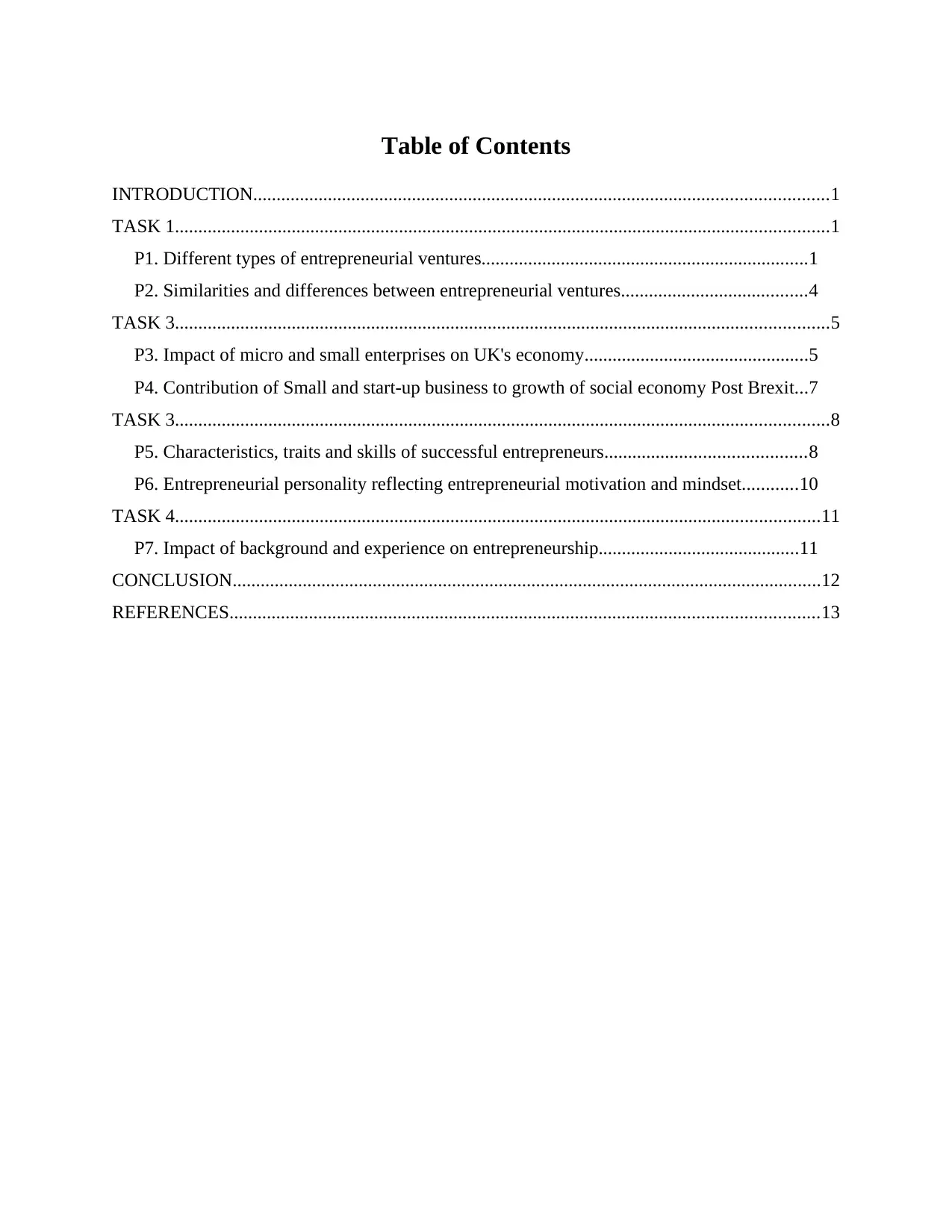
Table of Contents
INTRODUCTION...........................................................................................................................1
TASK 1............................................................................................................................................1
P1. Different types of entrepreneurial ventures......................................................................1
P2. Similarities and differences between entrepreneurial ventures........................................4
TASK 3............................................................................................................................................5
P3. Impact of micro and small enterprises on UK's economy................................................5
P4. Contribution of Small and start-up business to growth of social economy Post Brexit...7
TASK 3............................................................................................................................................8
P5. Characteristics, traits and skills of successful entrepreneurs...........................................8
P6. Entrepreneurial personality reflecting entrepreneurial motivation and mindset............10
TASK 4..........................................................................................................................................11
P7. Impact of background and experience on entrepreneurship...........................................11
CONCLUSION..............................................................................................................................12
REFERENCES..............................................................................................................................13
INTRODUCTION...........................................................................................................................1
TASK 1............................................................................................................................................1
P1. Different types of entrepreneurial ventures......................................................................1
P2. Similarities and differences between entrepreneurial ventures........................................4
TASK 3............................................................................................................................................5
P3. Impact of micro and small enterprises on UK's economy................................................5
P4. Contribution of Small and start-up business to growth of social economy Post Brexit...7
TASK 3............................................................................................................................................8
P5. Characteristics, traits and skills of successful entrepreneurs...........................................8
P6. Entrepreneurial personality reflecting entrepreneurial motivation and mindset............10
TASK 4..........................................................................................................................................11
P7. Impact of background and experience on entrepreneurship...........................................11
CONCLUSION..............................................................................................................................12
REFERENCES..............................................................................................................................13
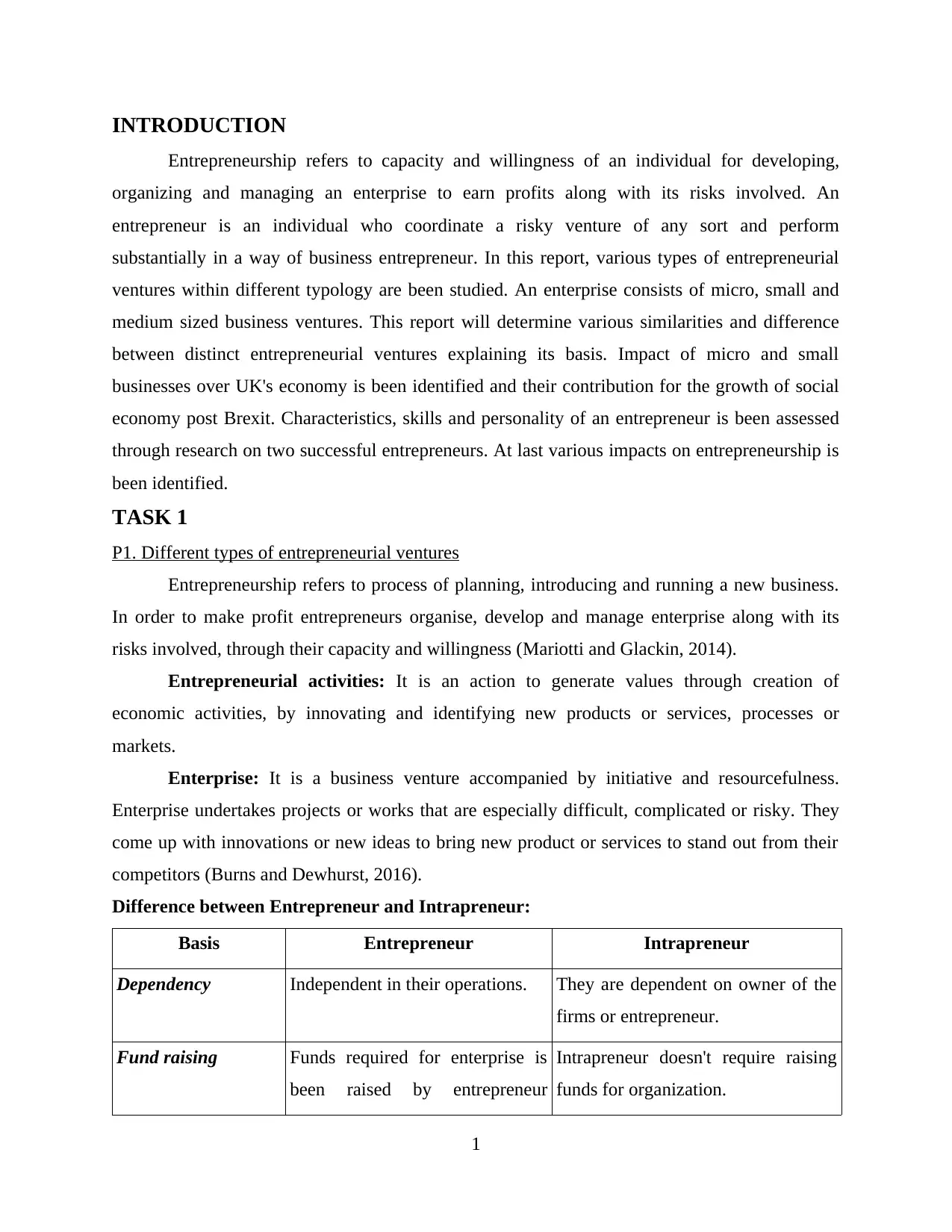
INTRODUCTION
Entrepreneurship refers to capacity and willingness of an individual for developing,
organizing and managing an enterprise to earn profits along with its risks involved. An
entrepreneur is an individual who coordinate a risky venture of any sort and perform
substantially in a way of business entrepreneur. In this report, various types of entrepreneurial
ventures within different typology are been studied. An enterprise consists of micro, small and
medium sized business ventures. This report will determine various similarities and difference
between distinct entrepreneurial ventures explaining its basis. Impact of micro and small
businesses over UK's economy is been identified and their contribution for the growth of social
economy post Brexit. Characteristics, skills and personality of an entrepreneur is been assessed
through research on two successful entrepreneurs. At last various impacts on entrepreneurship is
been identified.
TASK 1
P1. Different types of entrepreneurial ventures
Entrepreneurship refers to process of planning, introducing and running a new business.
In order to make profit entrepreneurs organise, develop and manage enterprise along with its
risks involved, through their capacity and willingness (Mariotti and Glackin, 2014).
Entrepreneurial activities: It is an action to generate values through creation of
economic activities, by innovating and identifying new products or services, processes or
markets.
Enterprise: It is a business venture accompanied by initiative and resourcefulness.
Enterprise undertakes projects or works that are especially difficult, complicated or risky. They
come up with innovations or new ideas to bring new product or services to stand out from their
competitors (Burns and Dewhurst, 2016).
Difference between Entrepreneur and Intrapreneur:
Basis Entrepreneur Intrapreneur
Dependency Independent in their operations. They are dependent on owner of the
firms or entrepreneur.
Fund raising Funds required for enterprise is
been raised by entrepreneur
Intrapreneur doesn't require raising
funds for organization.
1
Entrepreneurship refers to capacity and willingness of an individual for developing,
organizing and managing an enterprise to earn profits along with its risks involved. An
entrepreneur is an individual who coordinate a risky venture of any sort and perform
substantially in a way of business entrepreneur. In this report, various types of entrepreneurial
ventures within different typology are been studied. An enterprise consists of micro, small and
medium sized business ventures. This report will determine various similarities and difference
between distinct entrepreneurial ventures explaining its basis. Impact of micro and small
businesses over UK's economy is been identified and their contribution for the growth of social
economy post Brexit. Characteristics, skills and personality of an entrepreneur is been assessed
through research on two successful entrepreneurs. At last various impacts on entrepreneurship is
been identified.
TASK 1
P1. Different types of entrepreneurial ventures
Entrepreneurship refers to process of planning, introducing and running a new business.
In order to make profit entrepreneurs organise, develop and manage enterprise along with its
risks involved, through their capacity and willingness (Mariotti and Glackin, 2014).
Entrepreneurial activities: It is an action to generate values through creation of
economic activities, by innovating and identifying new products or services, processes or
markets.
Enterprise: It is a business venture accompanied by initiative and resourcefulness.
Enterprise undertakes projects or works that are especially difficult, complicated or risky. They
come up with innovations or new ideas to bring new product or services to stand out from their
competitors (Burns and Dewhurst, 2016).
Difference between Entrepreneur and Intrapreneur:
Basis Entrepreneur Intrapreneur
Dependency Independent in their operations. They are dependent on owner of the
firms or entrepreneur.
Fund raising Funds required for enterprise is
been raised by entrepreneur
Intrapreneur doesn't require raising
funds for organization.
1
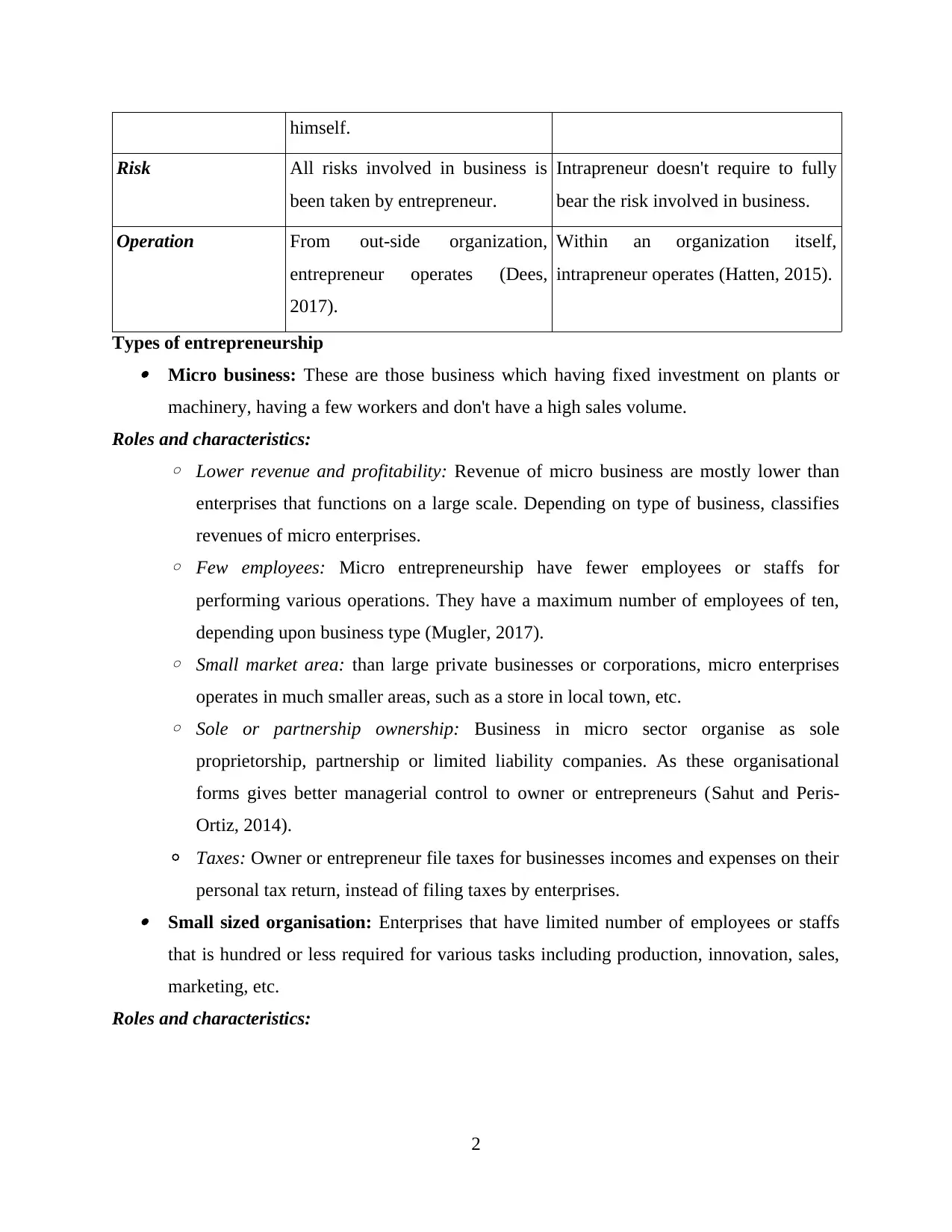
himself.
Risk All risks involved in business is
been taken by entrepreneur.
Intrapreneur doesn't require to fully
bear the risk involved in business.
Operation From out-side organization,
entrepreneur operates (Dees,
2017).
Within an organization itself,
intrapreneur operates (Hatten, 2015).
Types of entrepreneurship Micro business: These are those business which having fixed investment on plants or
machinery, having a few workers and don't have a high sales volume.
Roles and characteristics:
◦ Lower revenue and profitability: Revenue of micro business are mostly lower than
enterprises that functions on a large scale. Depending on type of business, classifies
revenues of micro enterprises.
◦ Few employees: Micro entrepreneurship have fewer employees or staffs for
performing various operations. They have a maximum number of employees of ten,
depending upon business type (Mugler, 2017).
◦ Small market area: than large private businesses or corporations, micro enterprises
operates in much smaller areas, such as a store in local town, etc.
◦ Sole or partnership ownership: Business in micro sector organise as sole
proprietorship, partnership or limited liability companies. As these organisational
forms gives better managerial control to owner or entrepreneurs (Sahut and Peris-
Ortiz, 2014).
◦ Taxes: Owner or entrepreneur file taxes for businesses incomes and expenses on their
personal tax return, instead of filing taxes by enterprises. Small sized organisation: Enterprises that have limited number of employees or staffs
that is hundred or less required for various tasks including production, innovation, sales,
marketing, etc.
Roles and characteristics:
2
Risk All risks involved in business is
been taken by entrepreneur.
Intrapreneur doesn't require to fully
bear the risk involved in business.
Operation From out-side organization,
entrepreneur operates (Dees,
2017).
Within an organization itself,
intrapreneur operates (Hatten, 2015).
Types of entrepreneurship Micro business: These are those business which having fixed investment on plants or
machinery, having a few workers and don't have a high sales volume.
Roles and characteristics:
◦ Lower revenue and profitability: Revenue of micro business are mostly lower than
enterprises that functions on a large scale. Depending on type of business, classifies
revenues of micro enterprises.
◦ Few employees: Micro entrepreneurship have fewer employees or staffs for
performing various operations. They have a maximum number of employees of ten,
depending upon business type (Mugler, 2017).
◦ Small market area: than large private businesses or corporations, micro enterprises
operates in much smaller areas, such as a store in local town, etc.
◦ Sole or partnership ownership: Business in micro sector organise as sole
proprietorship, partnership or limited liability companies. As these organisational
forms gives better managerial control to owner or entrepreneurs (Sahut and Peris-
Ortiz, 2014).
◦ Taxes: Owner or entrepreneur file taxes for businesses incomes and expenses on their
personal tax return, instead of filing taxes by enterprises. Small sized organisation: Enterprises that have limited number of employees or staffs
that is hundred or less required for various tasks including production, innovation, sales,
marketing, etc.
Roles and characteristics:
2
Secure Best Marks with AI Grader
Need help grading? Try our AI Grader for instant feedback on your assignments.
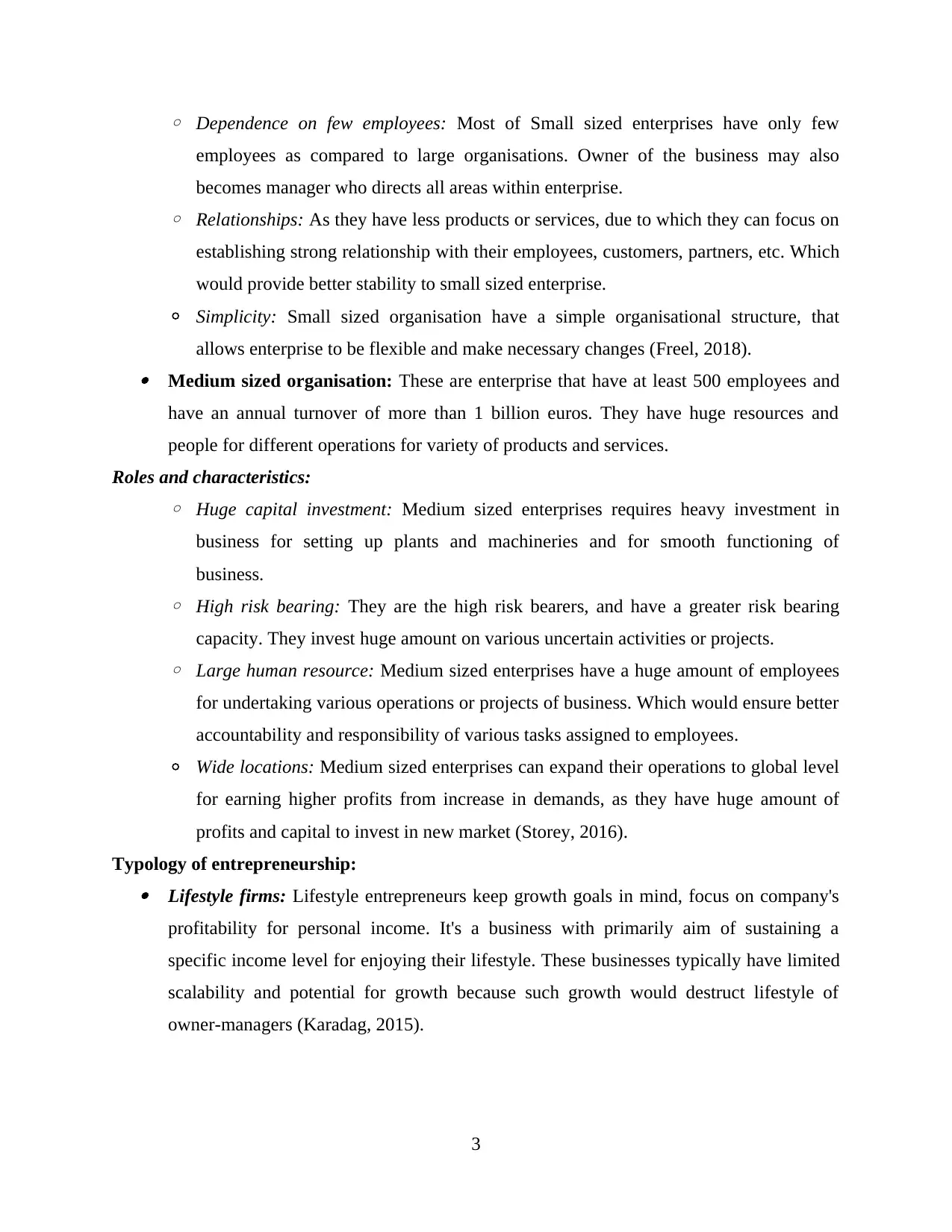
◦ Dependence on few employees: Most of Small sized enterprises have only few
employees as compared to large organisations. Owner of the business may also
becomes manager who directs all areas within enterprise.
◦ Relationships: As they have less products or services, due to which they can focus on
establishing strong relationship with their employees, customers, partners, etc. Which
would provide better stability to small sized enterprise.
◦ Simplicity: Small sized organisation have a simple organisational structure, that
allows enterprise to be flexible and make necessary changes (Freel, 2018). Medium sized organisation: These are enterprise that have at least 500 employees and
have an annual turnover of more than 1 billion euros. They have huge resources and
people for different operations for variety of products and services.
Roles and characteristics:
◦ Huge capital investment: Medium sized enterprises requires heavy investment in
business for setting up plants and machineries and for smooth functioning of
business.
◦ High risk bearing: They are the high risk bearers, and have a greater risk bearing
capacity. They invest huge amount on various uncertain activities or projects.
◦ Large human resource: Medium sized enterprises have a huge amount of employees
for undertaking various operations or projects of business. Which would ensure better
accountability and responsibility of various tasks assigned to employees.
◦ Wide locations: Medium sized enterprises can expand their operations to global level
for earning higher profits from increase in demands, as they have huge amount of
profits and capital to invest in new market (Storey, 2016).
Typology of entrepreneurship: Lifestyle firms: Lifestyle entrepreneurs keep growth goals in mind, focus on company's
profitability for personal income. It's a business with primarily aim of sustaining a
specific income level for enjoying their lifestyle. These businesses typically have limited
scalability and potential for growth because such growth would destruct lifestyle of
owner-managers (Karadag, 2015).
3
employees as compared to large organisations. Owner of the business may also
becomes manager who directs all areas within enterprise.
◦ Relationships: As they have less products or services, due to which they can focus on
establishing strong relationship with their employees, customers, partners, etc. Which
would provide better stability to small sized enterprise.
◦ Simplicity: Small sized organisation have a simple organisational structure, that
allows enterprise to be flexible and make necessary changes (Freel, 2018). Medium sized organisation: These are enterprise that have at least 500 employees and
have an annual turnover of more than 1 billion euros. They have huge resources and
people for different operations for variety of products and services.
Roles and characteristics:
◦ Huge capital investment: Medium sized enterprises requires heavy investment in
business for setting up plants and machineries and for smooth functioning of
business.
◦ High risk bearing: They are the high risk bearers, and have a greater risk bearing
capacity. They invest huge amount on various uncertain activities or projects.
◦ Large human resource: Medium sized enterprises have a huge amount of employees
for undertaking various operations or projects of business. Which would ensure better
accountability and responsibility of various tasks assigned to employees.
◦ Wide locations: Medium sized enterprises can expand their operations to global level
for earning higher profits from increase in demands, as they have huge amount of
profits and capital to invest in new market (Storey, 2016).
Typology of entrepreneurship: Lifestyle firms: Lifestyle entrepreneurs keep growth goals in mind, focus on company's
profitability for personal income. It's a business with primarily aim of sustaining a
specific income level for enjoying their lifestyle. These businesses typically have limited
scalability and potential for growth because such growth would destruct lifestyle of
owner-managers (Karadag, 2015).
3
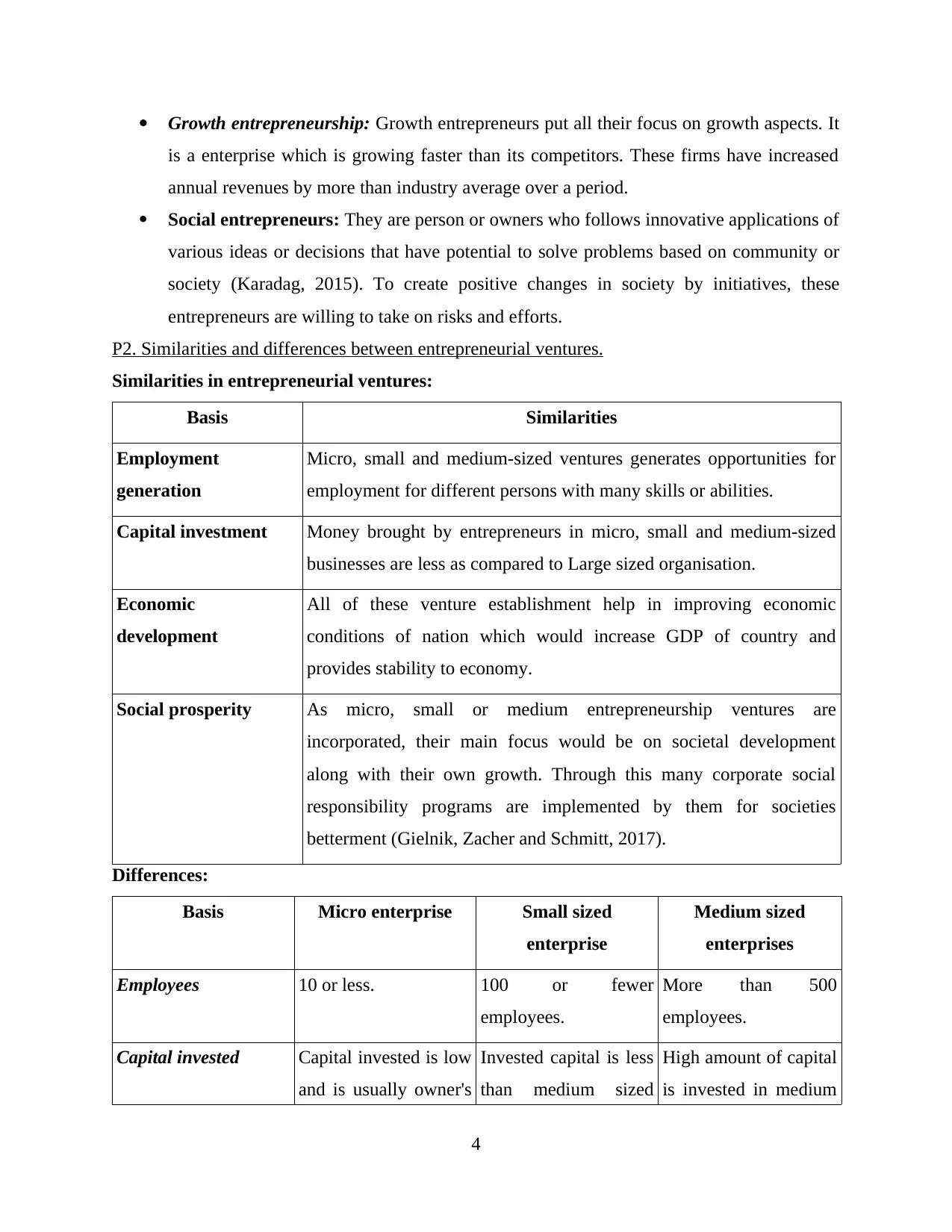
Growth entrepreneurship: Growth entrepreneurs put all their focus on growth aspects. It
is a enterprise which is growing faster than its competitors. These firms have increased
annual revenues by more than industry average over a period.
Social entrepreneurs: They are person or owners who follows innovative applications of
various ideas or decisions that have potential to solve problems based on community or
society (Karadag, 2015). To create positive changes in society by initiatives, these
entrepreneurs are willing to take on risks and efforts.
P2. Similarities and differences between entrepreneurial ventures.
Similarities in entrepreneurial ventures:
Basis Similarities
Employment
generation
Micro, small and medium-sized ventures generates opportunities for
employment for different persons with many skills or abilities.
Capital investment Money brought by entrepreneurs in micro, small and medium-sized
businesses are less as compared to Large sized organisation.
Economic
development
All of these venture establishment help in improving economic
conditions of nation which would increase GDP of country and
provides stability to economy.
Social prosperity As micro, small or medium entrepreneurship ventures are
incorporated, their main focus would be on societal development
along with their own growth. Through this many corporate social
responsibility programs are implemented by them for societies
betterment (Gielnik, Zacher and Schmitt, 2017).
Differences:
Basis Micro enterprise Small sized
enterprise
Medium sized
enterprises
Employees 10 or less. 100 or fewer
employees.
More than 500
employees.
Capital invested Capital invested is low
and is usually owner's
Invested capital is less
than medium sized
High amount of capital
is invested in medium
4
is a enterprise which is growing faster than its competitors. These firms have increased
annual revenues by more than industry average over a period.
Social entrepreneurs: They are person or owners who follows innovative applications of
various ideas or decisions that have potential to solve problems based on community or
society (Karadag, 2015). To create positive changes in society by initiatives, these
entrepreneurs are willing to take on risks and efforts.
P2. Similarities and differences between entrepreneurial ventures.
Similarities in entrepreneurial ventures:
Basis Similarities
Employment
generation
Micro, small and medium-sized ventures generates opportunities for
employment for different persons with many skills or abilities.
Capital investment Money brought by entrepreneurs in micro, small and medium-sized
businesses are less as compared to Large sized organisation.
Economic
development
All of these venture establishment help in improving economic
conditions of nation which would increase GDP of country and
provides stability to economy.
Social prosperity As micro, small or medium entrepreneurship ventures are
incorporated, their main focus would be on societal development
along with their own growth. Through this many corporate social
responsibility programs are implemented by them for societies
betterment (Gielnik, Zacher and Schmitt, 2017).
Differences:
Basis Micro enterprise Small sized
enterprise
Medium sized
enterprises
Employees 10 or less. 100 or fewer
employees.
More than 500
employees.
Capital invested Capital invested is low
and is usually owner's
Invested capital is less
than medium sized
High amount of capital
is invested in medium
4
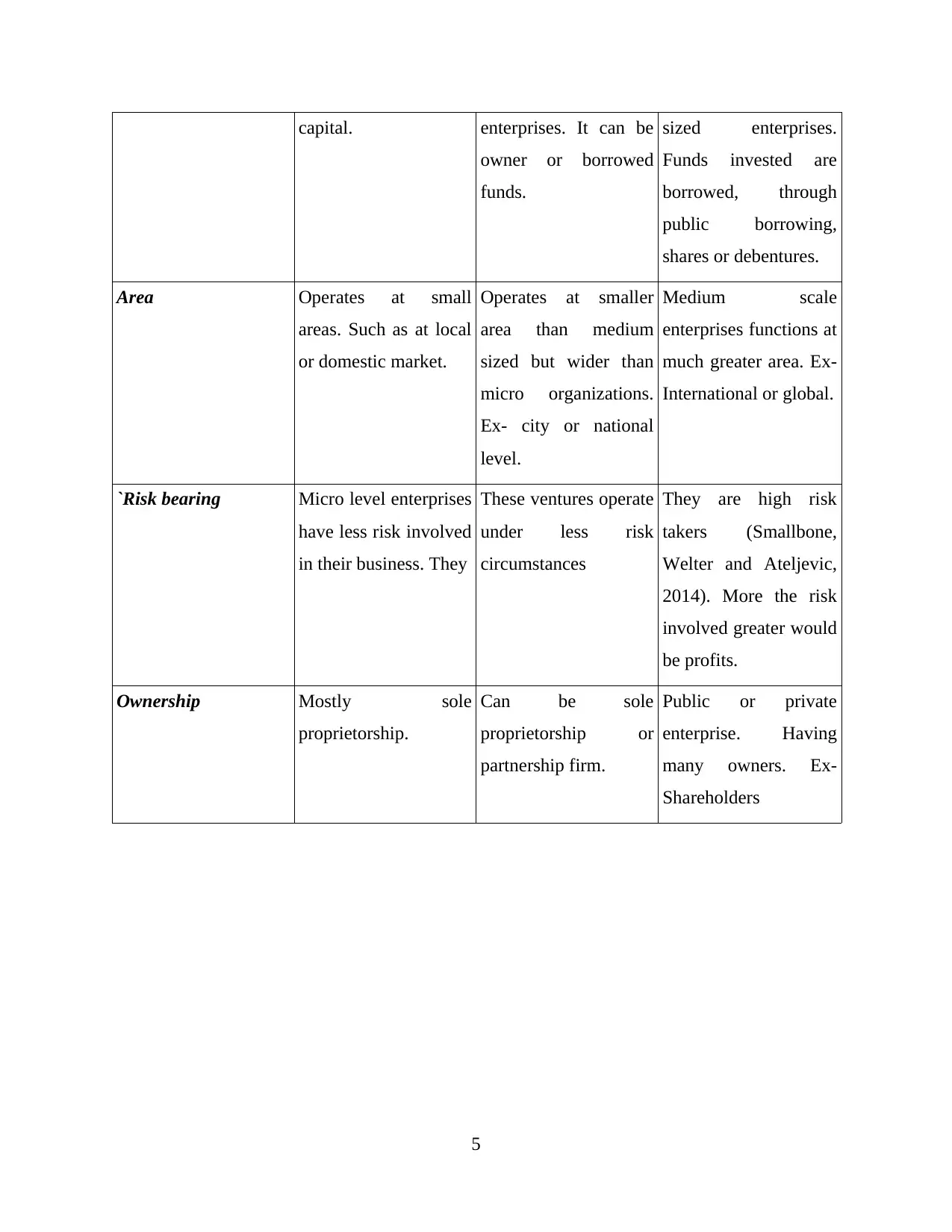
capital. enterprises. It can be
owner or borrowed
funds.
sized enterprises.
Funds invested are
borrowed, through
public borrowing,
shares or debentures.
Area Operates at small
areas. Such as at local
or domestic market.
Operates at smaller
area than medium
sized but wider than
micro organizations.
Ex- city or national
level.
Medium scale
enterprises functions at
much greater area. Ex-
International or global.
`Risk bearing Micro level enterprises
have less risk involved
in their business. They
These ventures operate
under less risk
circumstances
They are high risk
takers (Smallbone,
Welter and Ateljevic,
2014). More the risk
involved greater would
be profits.
Ownership Mostly sole
proprietorship.
Can be sole
proprietorship or
partnership firm.
Public or private
enterprise. Having
many owners. Ex-
Shareholders
5
owner or borrowed
funds.
sized enterprises.
Funds invested are
borrowed, through
public borrowing,
shares or debentures.
Area Operates at small
areas. Such as at local
or domestic market.
Operates at smaller
area than medium
sized but wider than
micro organizations.
Ex- city or national
level.
Medium scale
enterprises functions at
much greater area. Ex-
International or global.
`Risk bearing Micro level enterprises
have less risk involved
in their business. They
These ventures operate
under less risk
circumstances
They are high risk
takers (Smallbone,
Welter and Ateljevic,
2014). More the risk
involved greater would
be profits.
Ownership Mostly sole
proprietorship.
Can be sole
proprietorship or
partnership firm.
Public or private
enterprise. Having
many owners. Ex-
Shareholders
5
Paraphrase This Document
Need a fresh take? Get an instant paraphrase of this document with our AI Paraphraser
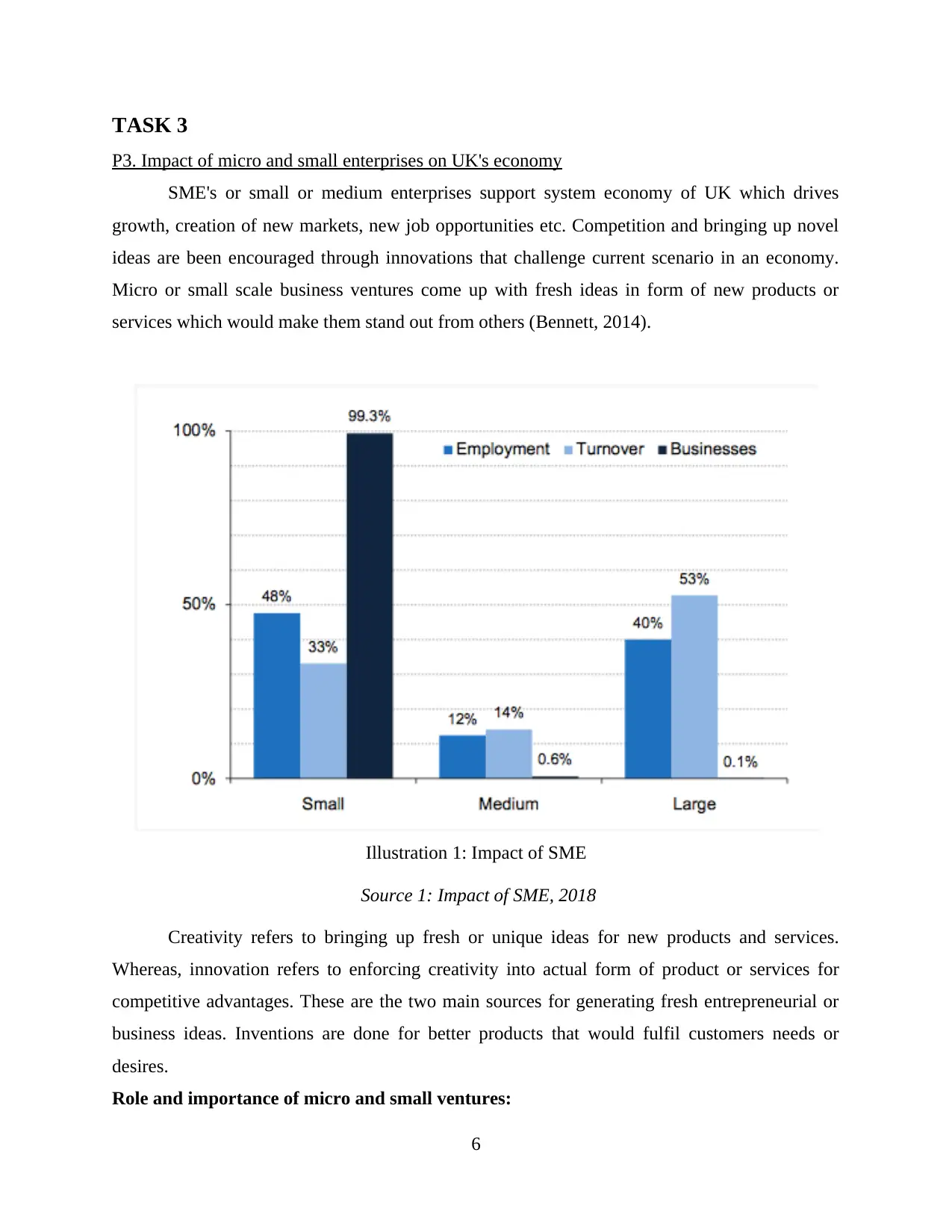
TASK 3
P3. Impact of micro and small enterprises on UK's economy
SME's or small or medium enterprises support system economy of UK which drives
growth, creation of new markets, new job opportunities etc. Competition and bringing up novel
ideas are been encouraged through innovations that challenge current scenario in an economy.
Micro or small scale business ventures come up with fresh ideas in form of new products or
services which would make them stand out from others (Bennett, 2014).
Source 1: Impact of SME, 2018
Creativity refers to bringing up fresh or unique ideas for new products and services.
Whereas, innovation refers to enforcing creativity into actual form of product or services for
competitive advantages. These are the two main sources for generating fresh entrepreneurial or
business ideas. Inventions are done for better products that would fulfil customers needs or
desires.
Role and importance of micro and small ventures:
6
Illustration 1: Impact of SME
P3. Impact of micro and small enterprises on UK's economy
SME's or small or medium enterprises support system economy of UK which drives
growth, creation of new markets, new job opportunities etc. Competition and bringing up novel
ideas are been encouraged through innovations that challenge current scenario in an economy.
Micro or small scale business ventures come up with fresh ideas in form of new products or
services which would make them stand out from others (Bennett, 2014).
Source 1: Impact of SME, 2018
Creativity refers to bringing up fresh or unique ideas for new products and services.
Whereas, innovation refers to enforcing creativity into actual form of product or services for
competitive advantages. These are the two main sources for generating fresh entrepreneurial or
business ideas. Inventions are done for better products that would fulfil customers needs or
desires.
Role and importance of micro and small ventures:
6
Illustration 1: Impact of SME
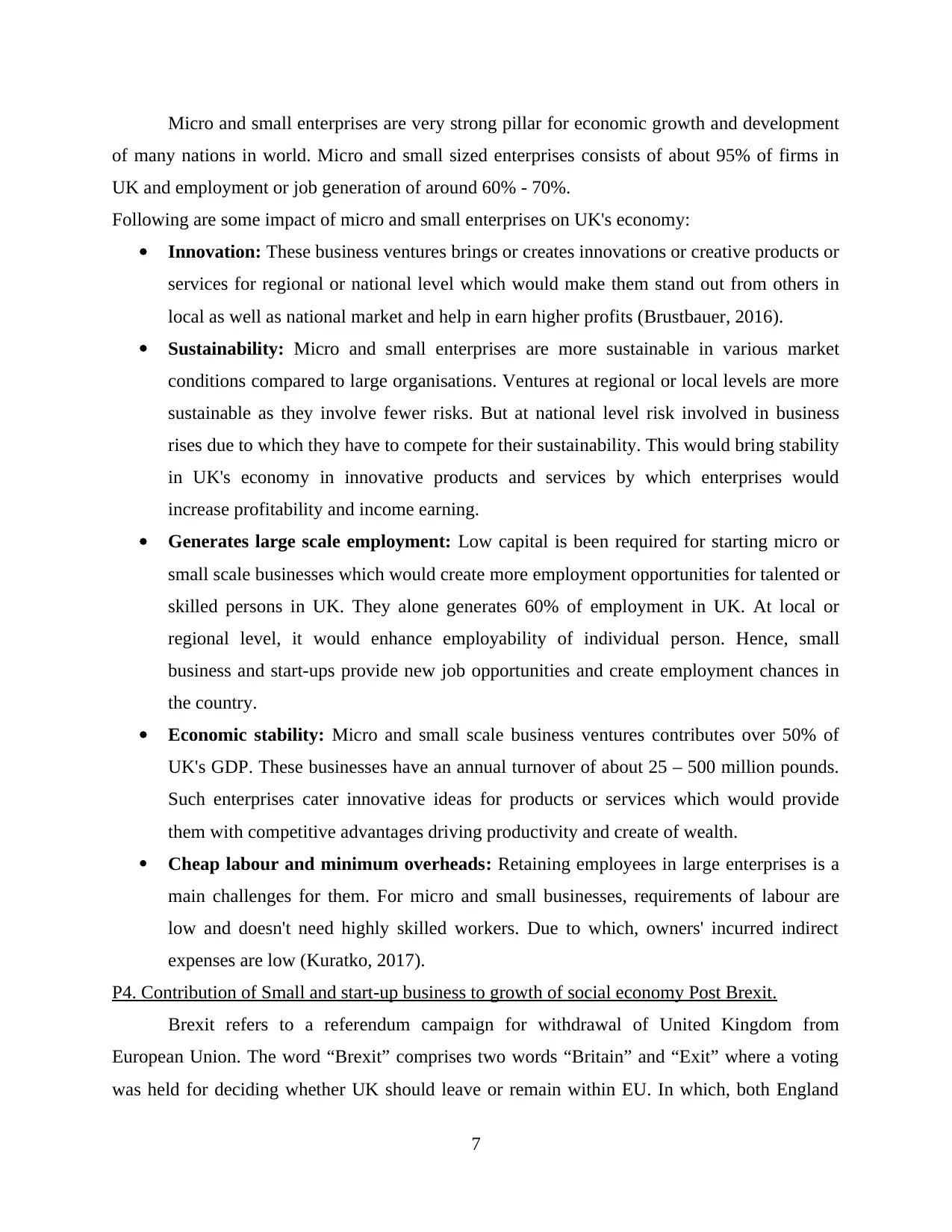
Micro and small enterprises are very strong pillar for economic growth and development
of many nations in world. Micro and small sized enterprises consists of about 95% of firms in
UK and employment or job generation of around 60% - 70%.
Following are some impact of micro and small enterprises on UK's economy:
Innovation: These business ventures brings or creates innovations or creative products or
services for regional or national level which would make them stand out from others in
local as well as national market and help in earn higher profits (Brustbauer, 2016).
Sustainability: Micro and small enterprises are more sustainable in various market
conditions compared to large organisations. Ventures at regional or local levels are more
sustainable as they involve fewer risks. But at national level risk involved in business
rises due to which they have to compete for their sustainability. This would bring stability
in UK's economy in innovative products and services by which enterprises would
increase profitability and income earning.
Generates large scale employment: Low capital is been required for starting micro or
small scale businesses which would create more employment opportunities for talented or
skilled persons in UK. They alone generates 60% of employment in UK. At local or
regional level, it would enhance employability of individual person. Hence, small
business and start-ups provide new job opportunities and create employment chances in
the country.
Economic stability: Micro and small scale business ventures contributes over 50% of
UK's GDP. These businesses have an annual turnover of about 25 – 500 million pounds.
Such enterprises cater innovative ideas for products or services which would provide
them with competitive advantages driving productivity and create of wealth.
Cheap labour and minimum overheads: Retaining employees in large enterprises is a
main challenges for them. For micro and small businesses, requirements of labour are
low and doesn't need highly skilled workers. Due to which, owners' incurred indirect
expenses are low (Kuratko, 2017).
P4. Contribution of Small and start-up business to growth of social economy Post Brexit.
Brexit refers to a referendum campaign for withdrawal of United Kingdom from
European Union. The word “Brexit” comprises two words “Britain” and “Exit” where a voting
was held for deciding whether UK should leave or remain within EU. In which, both England
7
of many nations in world. Micro and small sized enterprises consists of about 95% of firms in
UK and employment or job generation of around 60% - 70%.
Following are some impact of micro and small enterprises on UK's economy:
Innovation: These business ventures brings or creates innovations or creative products or
services for regional or national level which would make them stand out from others in
local as well as national market and help in earn higher profits (Brustbauer, 2016).
Sustainability: Micro and small enterprises are more sustainable in various market
conditions compared to large organisations. Ventures at regional or local levels are more
sustainable as they involve fewer risks. But at national level risk involved in business
rises due to which they have to compete for their sustainability. This would bring stability
in UK's economy in innovative products and services by which enterprises would
increase profitability and income earning.
Generates large scale employment: Low capital is been required for starting micro or
small scale businesses which would create more employment opportunities for talented or
skilled persons in UK. They alone generates 60% of employment in UK. At local or
regional level, it would enhance employability of individual person. Hence, small
business and start-ups provide new job opportunities and create employment chances in
the country.
Economic stability: Micro and small scale business ventures contributes over 50% of
UK's GDP. These businesses have an annual turnover of about 25 – 500 million pounds.
Such enterprises cater innovative ideas for products or services which would provide
them with competitive advantages driving productivity and create of wealth.
Cheap labour and minimum overheads: Retaining employees in large enterprises is a
main challenges for them. For micro and small businesses, requirements of labour are
low and doesn't need highly skilled workers. Due to which, owners' incurred indirect
expenses are low (Kuratko, 2017).
P4. Contribution of Small and start-up business to growth of social economy Post Brexit.
Brexit refers to a referendum campaign for withdrawal of United Kingdom from
European Union. The word “Brexit” comprises two words “Britain” and “Exit” where a voting
was held for deciding whether UK should leave or remain within EU. In which, both England
7
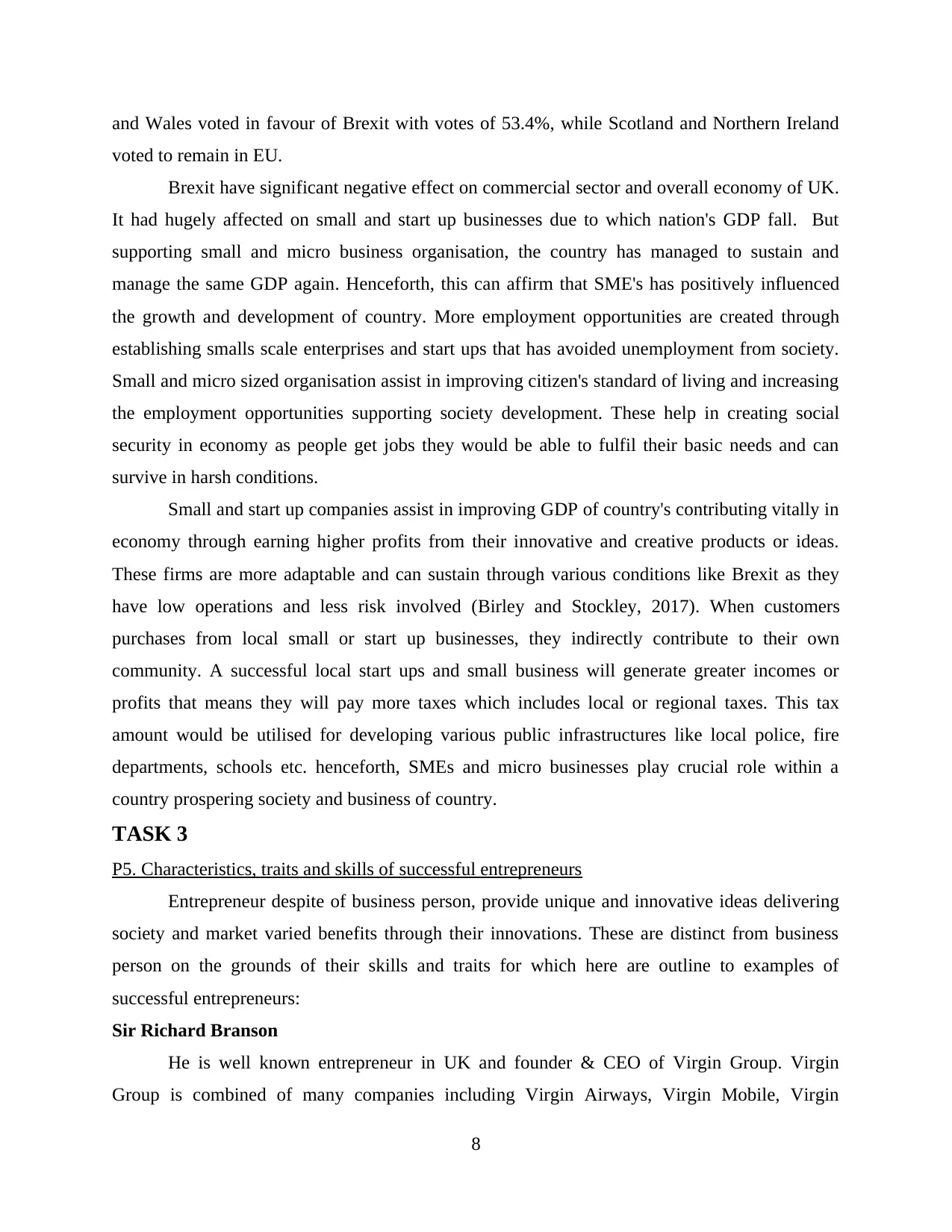
and Wales voted in favour of Brexit with votes of 53.4%, while Scotland and Northern Ireland
voted to remain in EU.
Brexit have significant negative effect on commercial sector and overall economy of UK.
It had hugely affected on small and start up businesses due to which nation's GDP fall. But
supporting small and micro business organisation, the country has managed to sustain and
manage the same GDP again. Henceforth, this can affirm that SME's has positively influenced
the growth and development of country. More employment opportunities are created through
establishing smalls scale enterprises and start ups that has avoided unemployment from society.
Small and micro sized organisation assist in improving citizen's standard of living and increasing
the employment opportunities supporting society development. These help in creating social
security in economy as people get jobs they would be able to fulfil their basic needs and can
survive in harsh conditions.
Small and start up companies assist in improving GDP of country's contributing vitally in
economy through earning higher profits from their innovative and creative products or ideas.
These firms are more adaptable and can sustain through various conditions like Brexit as they
have low operations and less risk involved (Birley and Stockley, 2017). When customers
purchases from local small or start up businesses, they indirectly contribute to their own
community. A successful local start ups and small business will generate greater incomes or
profits that means they will pay more taxes which includes local or regional taxes. This tax
amount would be utilised for developing various public infrastructures like local police, fire
departments, schools etc. henceforth, SMEs and micro businesses play crucial role within a
country prospering society and business of country.
TASK 3
P5. Characteristics, traits and skills of successful entrepreneurs
Entrepreneur despite of business person, provide unique and innovative ideas delivering
society and market varied benefits through their innovations. These are distinct from business
person on the grounds of their skills and traits for which here are outline to examples of
successful entrepreneurs:
Sir Richard Branson
He is well known entrepreneur in UK and founder & CEO of Virgin Group. Virgin
Group is combined of many companies including Virgin Airways, Virgin Mobile, Virgin
8
voted to remain in EU.
Brexit have significant negative effect on commercial sector and overall economy of UK.
It had hugely affected on small and start up businesses due to which nation's GDP fall. But
supporting small and micro business organisation, the country has managed to sustain and
manage the same GDP again. Henceforth, this can affirm that SME's has positively influenced
the growth and development of country. More employment opportunities are created through
establishing smalls scale enterprises and start ups that has avoided unemployment from society.
Small and micro sized organisation assist in improving citizen's standard of living and increasing
the employment opportunities supporting society development. These help in creating social
security in economy as people get jobs they would be able to fulfil their basic needs and can
survive in harsh conditions.
Small and start up companies assist in improving GDP of country's contributing vitally in
economy through earning higher profits from their innovative and creative products or ideas.
These firms are more adaptable and can sustain through various conditions like Brexit as they
have low operations and less risk involved (Birley and Stockley, 2017). When customers
purchases from local small or start up businesses, they indirectly contribute to their own
community. A successful local start ups and small business will generate greater incomes or
profits that means they will pay more taxes which includes local or regional taxes. This tax
amount would be utilised for developing various public infrastructures like local police, fire
departments, schools etc. henceforth, SMEs and micro businesses play crucial role within a
country prospering society and business of country.
TASK 3
P5. Characteristics, traits and skills of successful entrepreneurs
Entrepreneur despite of business person, provide unique and innovative ideas delivering
society and market varied benefits through their innovations. These are distinct from business
person on the grounds of their skills and traits for which here are outline to examples of
successful entrepreneurs:
Sir Richard Branson
He is well known entrepreneur in UK and founder & CEO of Virgin Group. Virgin
Group is combined of many companies including Virgin Airways, Virgin Mobile, Virgin
8
Secure Best Marks with AI Grader
Need help grading? Try our AI Grader for instant feedback on your assignments.
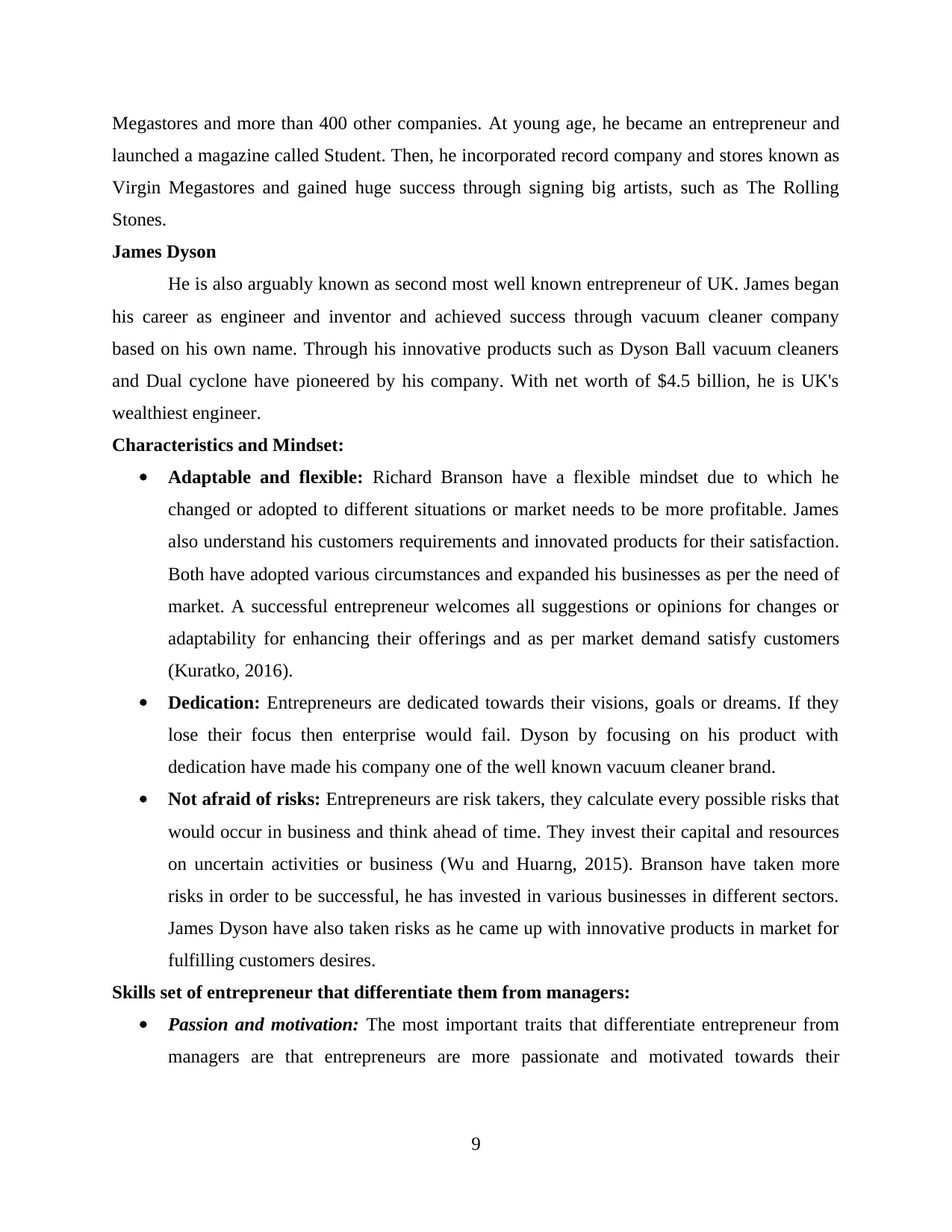
Megastores and more than 400 other companies. At young age, he became an entrepreneur and
launched a magazine called Student. Then, he incorporated record company and stores known as
Virgin Megastores and gained huge success through signing big artists, such as The Rolling
Stones.
James Dyson
He is also arguably known as second most well known entrepreneur of UK. James began
his career as engineer and inventor and achieved success through vacuum cleaner company
based on his own name. Through his innovative products such as Dyson Ball vacuum cleaners
and Dual cyclone have pioneered by his company. With net worth of $4.5 billion, he is UK's
wealthiest engineer.
Characteristics and Mindset:
Adaptable and flexible: Richard Branson have a flexible mindset due to which he
changed or adopted to different situations or market needs to be more profitable. James
also understand his customers requirements and innovated products for their satisfaction.
Both have adopted various circumstances and expanded his businesses as per the need of
market. A successful entrepreneur welcomes all suggestions or opinions for changes or
adaptability for enhancing their offerings and as per market demand satisfy customers
(Kuratko, 2016).
Dedication: Entrepreneurs are dedicated towards their visions, goals or dreams. If they
lose their focus then enterprise would fail. Dyson by focusing on his product with
dedication have made his company one of the well known vacuum cleaner brand.
Not afraid of risks: Entrepreneurs are risk takers, they calculate every possible risks that
would occur in business and think ahead of time. They invest their capital and resources
on uncertain activities or business (Wu and Huarng, 2015). Branson have taken more
risks in order to be successful, he has invested in various businesses in different sectors.
James Dyson have also taken risks as he came up with innovative products in market for
fulfilling customers desires.
Skills set of entrepreneur that differentiate them from managers:
Passion and motivation: The most important traits that differentiate entrepreneur from
managers are that entrepreneurs are more passionate and motivated towards their
9
launched a magazine called Student. Then, he incorporated record company and stores known as
Virgin Megastores and gained huge success through signing big artists, such as The Rolling
Stones.
James Dyson
He is also arguably known as second most well known entrepreneur of UK. James began
his career as engineer and inventor and achieved success through vacuum cleaner company
based on his own name. Through his innovative products such as Dyson Ball vacuum cleaners
and Dual cyclone have pioneered by his company. With net worth of $4.5 billion, he is UK's
wealthiest engineer.
Characteristics and Mindset:
Adaptable and flexible: Richard Branson have a flexible mindset due to which he
changed or adopted to different situations or market needs to be more profitable. James
also understand his customers requirements and innovated products for their satisfaction.
Both have adopted various circumstances and expanded his businesses as per the need of
market. A successful entrepreneur welcomes all suggestions or opinions for changes or
adaptability for enhancing their offerings and as per market demand satisfy customers
(Kuratko, 2016).
Dedication: Entrepreneurs are dedicated towards their visions, goals or dreams. If they
lose their focus then enterprise would fail. Dyson by focusing on his product with
dedication have made his company one of the well known vacuum cleaner brand.
Not afraid of risks: Entrepreneurs are risk takers, they calculate every possible risks that
would occur in business and think ahead of time. They invest their capital and resources
on uncertain activities or business (Wu and Huarng, 2015). Branson have taken more
risks in order to be successful, he has invested in various businesses in different sectors.
James Dyson have also taken risks as he came up with innovative products in market for
fulfilling customers desires.
Skills set of entrepreneur that differentiate them from managers:
Passion and motivation: The most important traits that differentiate entrepreneur from
managers are that entrepreneurs are more passionate and motivated towards their
9
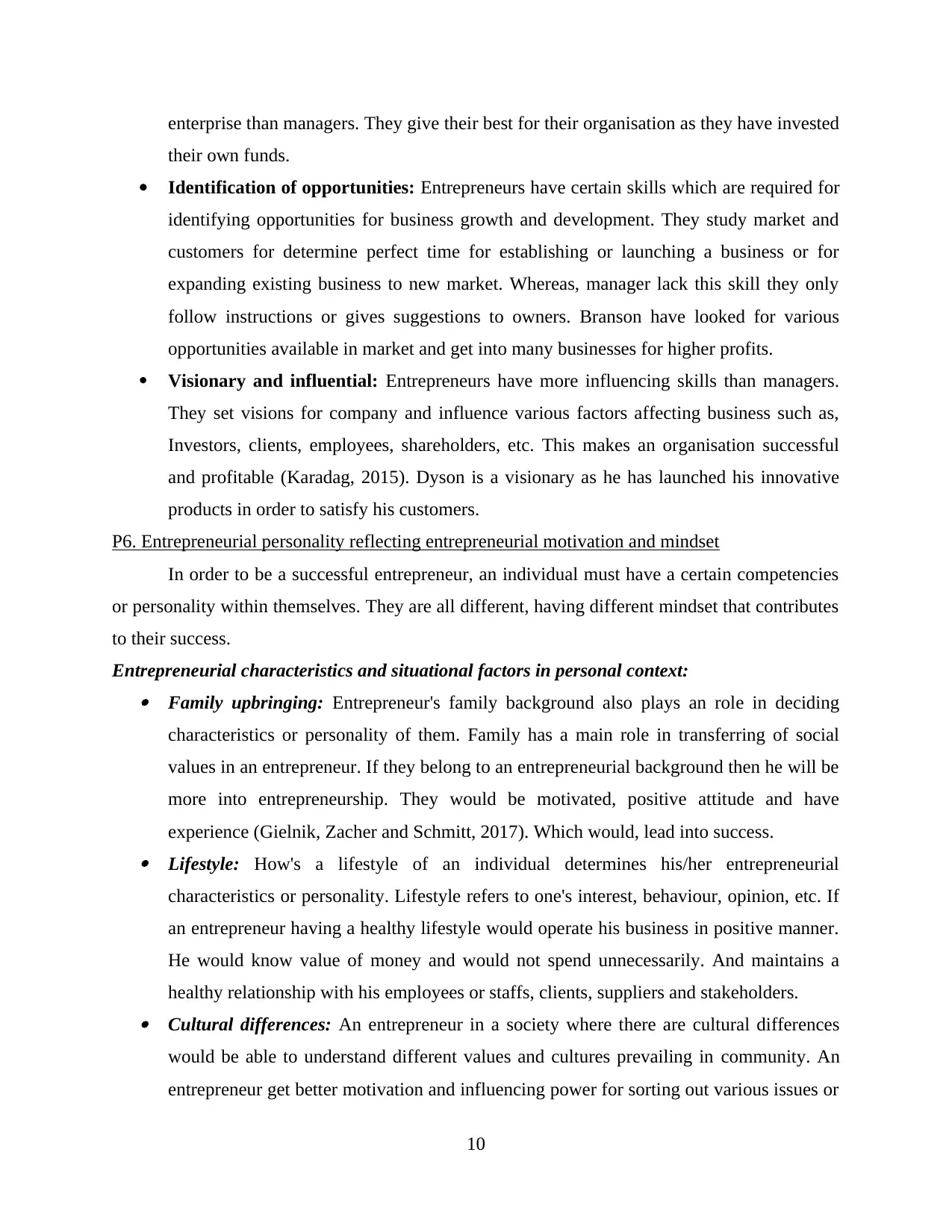
enterprise than managers. They give their best for their organisation as they have invested
their own funds.
Identification of opportunities: Entrepreneurs have certain skills which are required for
identifying opportunities for business growth and development. They study market and
customers for determine perfect time for establishing or launching a business or for
expanding existing business to new market. Whereas, manager lack this skill they only
follow instructions or gives suggestions to owners. Branson have looked for various
opportunities available in market and get into many businesses for higher profits.
Visionary and influential: Entrepreneurs have more influencing skills than managers.
They set visions for company and influence various factors affecting business such as,
Investors, clients, employees, shareholders, etc. This makes an organisation successful
and profitable (Karadag, 2015). Dyson is a visionary as he has launched his innovative
products in order to satisfy his customers.
P6. Entrepreneurial personality reflecting entrepreneurial motivation and mindset
In order to be a successful entrepreneur, an individual must have a certain competencies
or personality within themselves. They are all different, having different mindset that contributes
to their success.
Entrepreneurial characteristics and situational factors in personal context: Family upbringing: Entrepreneur's family background also plays an role in deciding
characteristics or personality of them. Family has a main role in transferring of social
values in an entrepreneur. If they belong to an entrepreneurial background then he will be
more into entrepreneurship. They would be motivated, positive attitude and have
experience (Gielnik, Zacher and Schmitt, 2017). Which would, lead into success. Lifestyle: How's a lifestyle of an individual determines his/her entrepreneurial
characteristics or personality. Lifestyle refers to one's interest, behaviour, opinion, etc. If
an entrepreneur having a healthy lifestyle would operate his business in positive manner.
He would know value of money and would not spend unnecessarily. And maintains a
healthy relationship with his employees or staffs, clients, suppliers and stakeholders. Cultural differences: An entrepreneur in a society where there are cultural differences
would be able to understand different values and cultures prevailing in community. An
entrepreneur get better motivation and influencing power for sorting out various issues or
10
their own funds.
Identification of opportunities: Entrepreneurs have certain skills which are required for
identifying opportunities for business growth and development. They study market and
customers for determine perfect time for establishing or launching a business or for
expanding existing business to new market. Whereas, manager lack this skill they only
follow instructions or gives suggestions to owners. Branson have looked for various
opportunities available in market and get into many businesses for higher profits.
Visionary and influential: Entrepreneurs have more influencing skills than managers.
They set visions for company and influence various factors affecting business such as,
Investors, clients, employees, shareholders, etc. This makes an organisation successful
and profitable (Karadag, 2015). Dyson is a visionary as he has launched his innovative
products in order to satisfy his customers.
P6. Entrepreneurial personality reflecting entrepreneurial motivation and mindset
In order to be a successful entrepreneur, an individual must have a certain competencies
or personality within themselves. They are all different, having different mindset that contributes
to their success.
Entrepreneurial characteristics and situational factors in personal context: Family upbringing: Entrepreneur's family background also plays an role in deciding
characteristics or personality of them. Family has a main role in transferring of social
values in an entrepreneur. If they belong to an entrepreneurial background then he will be
more into entrepreneurship. They would be motivated, positive attitude and have
experience (Gielnik, Zacher and Schmitt, 2017). Which would, lead into success. Lifestyle: How's a lifestyle of an individual determines his/her entrepreneurial
characteristics or personality. Lifestyle refers to one's interest, behaviour, opinion, etc. If
an entrepreneur having a healthy lifestyle would operate his business in positive manner.
He would know value of money and would not spend unnecessarily. And maintains a
healthy relationship with his employees or staffs, clients, suppliers and stakeholders. Cultural differences: An entrepreneur in a society where there are cultural differences
would be able to understand different values and cultures prevailing in community. An
entrepreneur get better motivation and influencing power for sorting out various issues or
10
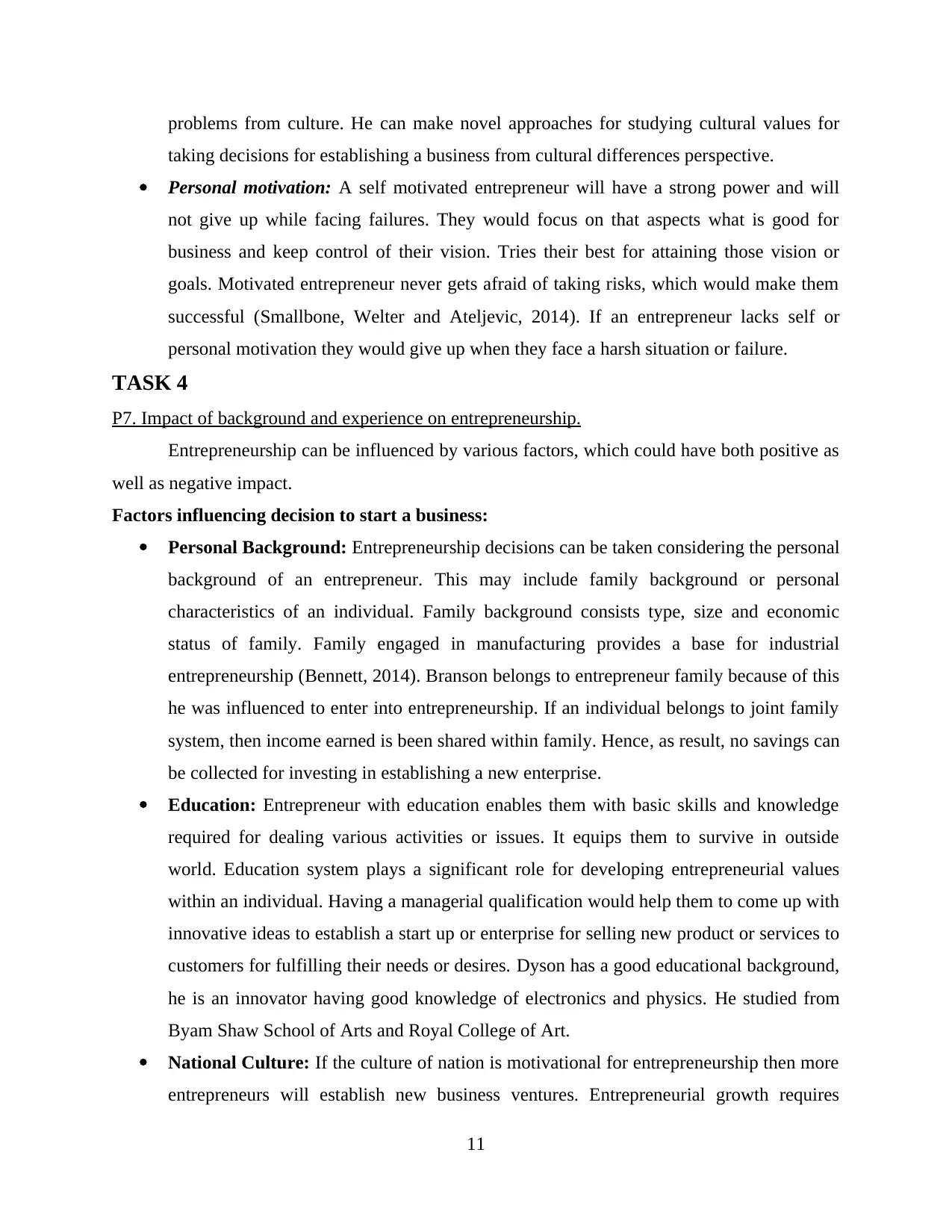
problems from culture. He can make novel approaches for studying cultural values for
taking decisions for establishing a business from cultural differences perspective.
Personal motivation: A self motivated entrepreneur will have a strong power and will
not give up while facing failures. They would focus on that aspects what is good for
business and keep control of their vision. Tries their best for attaining those vision or
goals. Motivated entrepreneur never gets afraid of taking risks, which would make them
successful (Smallbone, Welter and Ateljevic, 2014). If an entrepreneur lacks self or
personal motivation they would give up when they face a harsh situation or failure.
TASK 4
P7. Impact of background and experience on entrepreneurship.
Entrepreneurship can be influenced by various factors, which could have both positive as
well as negative impact.
Factors influencing decision to start a business:
Personal Background: Entrepreneurship decisions can be taken considering the personal
background of an entrepreneur. This may include family background or personal
characteristics of an individual. Family background consists type, size and economic
status of family. Family engaged in manufacturing provides a base for industrial
entrepreneurship (Bennett, 2014). Branson belongs to entrepreneur family because of this
he was influenced to enter into entrepreneurship. If an individual belongs to joint family
system, then income earned is been shared within family. Hence, as result, no savings can
be collected for investing in establishing a new enterprise.
Education: Entrepreneur with education enables them with basic skills and knowledge
required for dealing various activities or issues. It equips them to survive in outside
world. Education system plays a significant role for developing entrepreneurial values
within an individual. Having a managerial qualification would help them to come up with
innovative ideas to establish a start up or enterprise for selling new product or services to
customers for fulfilling their needs or desires. Dyson has a good educational background,
he is an innovator having good knowledge of electronics and physics. He studied from
Byam Shaw School of Arts and Royal College of Art.
National Culture: If the culture of nation is motivational for entrepreneurship then more
entrepreneurs will establish new business ventures. Entrepreneurial growth requires
11
taking decisions for establishing a business from cultural differences perspective.
Personal motivation: A self motivated entrepreneur will have a strong power and will
not give up while facing failures. They would focus on that aspects what is good for
business and keep control of their vision. Tries their best for attaining those vision or
goals. Motivated entrepreneur never gets afraid of taking risks, which would make them
successful (Smallbone, Welter and Ateljevic, 2014). If an entrepreneur lacks self or
personal motivation they would give up when they face a harsh situation or failure.
TASK 4
P7. Impact of background and experience on entrepreneurship.
Entrepreneurship can be influenced by various factors, which could have both positive as
well as negative impact.
Factors influencing decision to start a business:
Personal Background: Entrepreneurship decisions can be taken considering the personal
background of an entrepreneur. This may include family background or personal
characteristics of an individual. Family background consists type, size and economic
status of family. Family engaged in manufacturing provides a base for industrial
entrepreneurship (Bennett, 2014). Branson belongs to entrepreneur family because of this
he was influenced to enter into entrepreneurship. If an individual belongs to joint family
system, then income earned is been shared within family. Hence, as result, no savings can
be collected for investing in establishing a new enterprise.
Education: Entrepreneur with education enables them with basic skills and knowledge
required for dealing various activities or issues. It equips them to survive in outside
world. Education system plays a significant role for developing entrepreneurial values
within an individual. Having a managerial qualification would help them to come up with
innovative ideas to establish a start up or enterprise for selling new product or services to
customers for fulfilling their needs or desires. Dyson has a good educational background,
he is an innovator having good knowledge of electronics and physics. He studied from
Byam Shaw School of Arts and Royal College of Art.
National Culture: If the culture of nation is motivational for entrepreneurship then more
entrepreneurs will establish new business ventures. Entrepreneurial growth requires
11
Paraphrase This Document
Need a fresh take? Get an instant paraphrase of this document with our AI Paraphraser
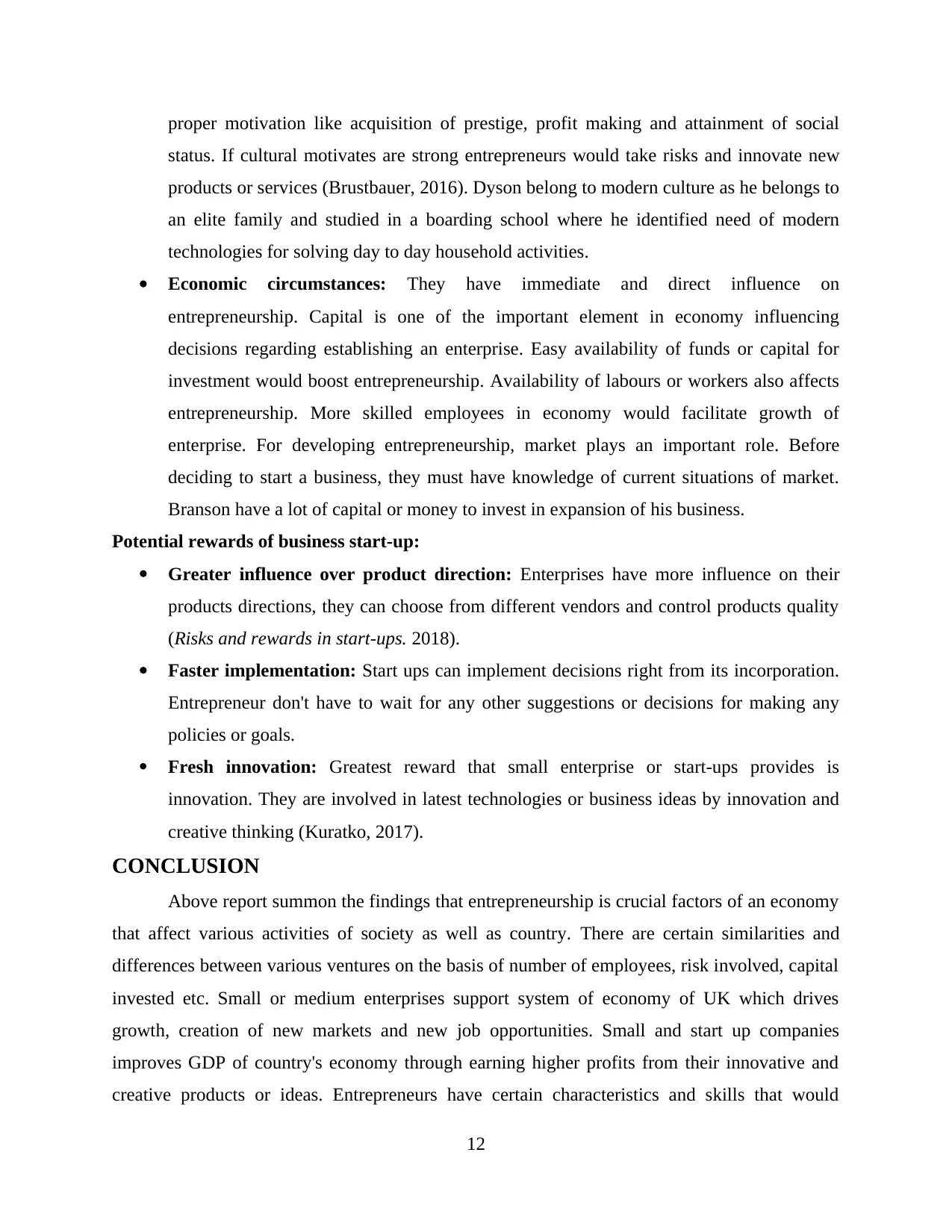
proper motivation like acquisition of prestige, profit making and attainment of social
status. If cultural motivates are strong entrepreneurs would take risks and innovate new
products or services (Brustbauer, 2016). Dyson belong to modern culture as he belongs to
an elite family and studied in a boarding school where he identified need of modern
technologies for solving day to day household activities.
Economic circumstances: They have immediate and direct influence on
entrepreneurship. Capital is one of the important element in economy influencing
decisions regarding establishing an enterprise. Easy availability of funds or capital for
investment would boost entrepreneurship. Availability of labours or workers also affects
entrepreneurship. More skilled employees in economy would facilitate growth of
enterprise. For developing entrepreneurship, market plays an important role. Before
deciding to start a business, they must have knowledge of current situations of market.
Branson have a lot of capital or money to invest in expansion of his business.
Potential rewards of business start-up:
Greater influence over product direction: Enterprises have more influence on their
products directions, they can choose from different vendors and control products quality
(Risks and rewards in start-ups. 2018).
Faster implementation: Start ups can implement decisions right from its incorporation.
Entrepreneur don't have to wait for any other suggestions or decisions for making any
policies or goals.
Fresh innovation: Greatest reward that small enterprise or start-ups provides is
innovation. They are involved in latest technologies or business ideas by innovation and
creative thinking (Kuratko, 2017).
CONCLUSION
Above report summon the findings that entrepreneurship is crucial factors of an economy
that affect various activities of society as well as country. There are certain similarities and
differences between various ventures on the basis of number of employees, risk involved, capital
invested etc. Small or medium enterprises support system of economy of UK which drives
growth, creation of new markets and new job opportunities. Small and start up companies
improves GDP of country's economy through earning higher profits from their innovative and
creative products or ideas. Entrepreneurs have certain characteristics and skills that would
12
status. If cultural motivates are strong entrepreneurs would take risks and innovate new
products or services (Brustbauer, 2016). Dyson belong to modern culture as he belongs to
an elite family and studied in a boarding school where he identified need of modern
technologies for solving day to day household activities.
Economic circumstances: They have immediate and direct influence on
entrepreneurship. Capital is one of the important element in economy influencing
decisions regarding establishing an enterprise. Easy availability of funds or capital for
investment would boost entrepreneurship. Availability of labours or workers also affects
entrepreneurship. More skilled employees in economy would facilitate growth of
enterprise. For developing entrepreneurship, market plays an important role. Before
deciding to start a business, they must have knowledge of current situations of market.
Branson have a lot of capital or money to invest in expansion of his business.
Potential rewards of business start-up:
Greater influence over product direction: Enterprises have more influence on their
products directions, they can choose from different vendors and control products quality
(Risks and rewards in start-ups. 2018).
Faster implementation: Start ups can implement decisions right from its incorporation.
Entrepreneur don't have to wait for any other suggestions or decisions for making any
policies or goals.
Fresh innovation: Greatest reward that small enterprise or start-ups provides is
innovation. They are involved in latest technologies or business ideas by innovation and
creative thinking (Kuratko, 2017).
CONCLUSION
Above report summon the findings that entrepreneurship is crucial factors of an economy
that affect various activities of society as well as country. There are certain similarities and
differences between various ventures on the basis of number of employees, risk involved, capital
invested etc. Small or medium enterprises support system of economy of UK which drives
growth, creation of new markets and new job opportunities. Small and start up companies
improves GDP of country's economy through earning higher profits from their innovative and
creative products or ideas. Entrepreneurs have certain characteristics and skills that would
12

differentiate them from manager such as risk taker, innovating, etc. Entrepreneurship can be
influenced by various factors which could have both positive as well as negative impact.
13
influenced by various factors which could have both positive as well as negative impact.
13
1 out of 15
Related Documents
Your All-in-One AI-Powered Toolkit for Academic Success.
+13062052269
info@desklib.com
Available 24*7 on WhatsApp / Email
![[object Object]](/_next/static/media/star-bottom.7253800d.svg)
Unlock your academic potential
© 2024 | Zucol Services PVT LTD | All rights reserved.





